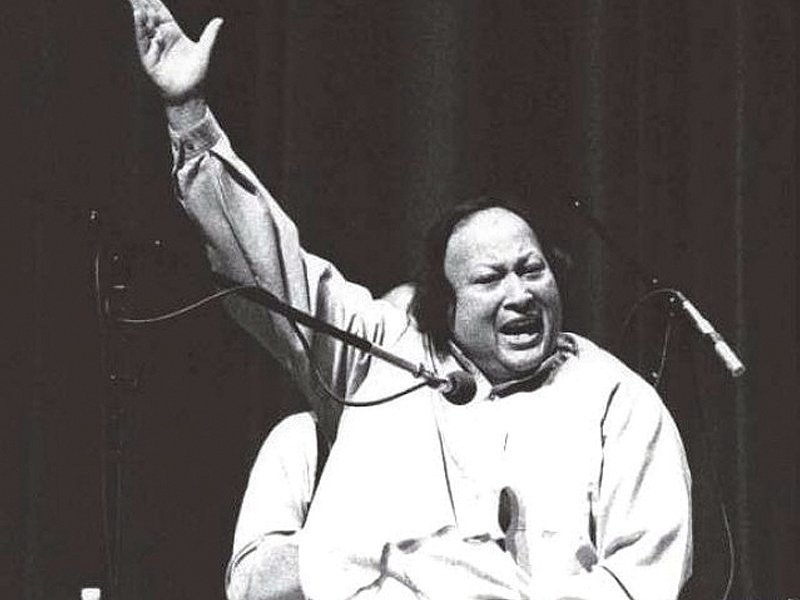
The man sold his soul to the devil. He must have. For what other way could his voice achieve such a status of transcendence? Nusrat Fateh Ali Khan was man, mystic and messenger; the face of Qawaali, the incarnation of Sufism. If he did not strike a deal with the devil, he surely must have struck one with the heavens.
An hour-long session titled ‘He Sang to Our Souls’ at the 6th Karachi Literature Festival with Pierre-Alain Baud, researcher on Sufi music, and historian Nomanul Haq kicked off on Saturday with moderator Ali Sethi reading a few passages from Baud’s biography of the South-Asian giant of music named after the man himself.

Sethi, a classically-trained musician, read out this ode with a certain amount of reverence, the kind one has when reading a holy scripture, the story of a saint. It is difficult to sum up Khan sahab’s contradictions. The passage read by Sethi indicated Baud takes cautious stock of this in his book. Baud describes Khan as free and restricted, local and universal, someone able to remain grounded and yet fly: to seamlessly drop down to the lower end of the sound spectrum after touching peaks that defy gravity.
Nomanul Haq echoed this perplexing paradox. “Sufism is about separation, the separation of the love from the beloved. Without separation, the two cannot exist. There is no drop when it falls into the ocean; then, it is just the ocean. And yet, Sufism is about overcoming this separation. Khan Sahib embodies this contradiction.”

An hour is hardly enough to even begin to list Khan’s extensive portfolio. There are too many albums to his credit to name, too many hits to count. The speakers and the moderator knew this all too well. So instead of poring over the works of this colossal force of music, they focused on the mood that moulded it. Both Baud and Haq acknowledged the global appeal of Khan was a result of his cosmic character: yet another contradiction.
After the speakers wrapped up their observations, a member from the audience struck the right note with his observation. He asked them if Khan’s ability to sing like a woman, in the higher register, encapsulated the Yin and the Yang. The remark struck home with Baud, who added to this by citing Abida Parveen’s rumbling lows: the oneness of man and woman, their boundaries blurred by universal love.
But the man who took over the world with his voice almost deprived it of his melodies. His father, renowned Qawaal Fateh Ali Khan had deemed his son’s voice too unconventional. He had also thought of a more ‘reputable’ profession for his offspring; perhaps a doctor or an engineer. Fortunately, the stars aligned themselves to ensure the one that shone the brightest, was the brightest. Listen carefully.
Published in The Express Tribune, February 8th, 2015.
Like Life & Style on Facebook, follow @ETLifeandStyle on Twitter for the latest in fashion, gossip and entertainment.






1732308855-0/17-Lede-(Image)1732308855-0-270x192.webp)










COMMENTS (1)
Comments are moderated and generally will be posted if they are on-topic and not abusive.
For more information, please see our Comments FAQ